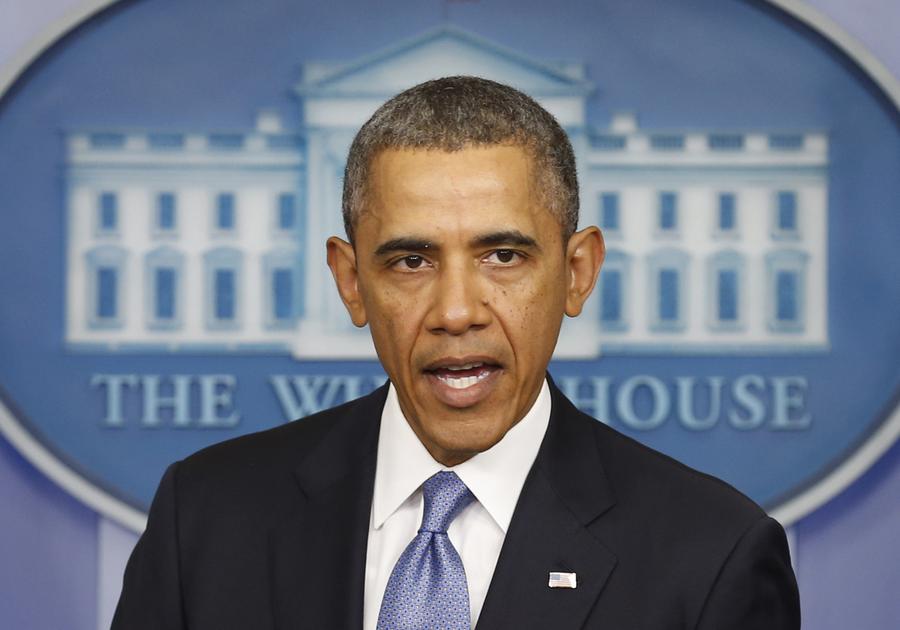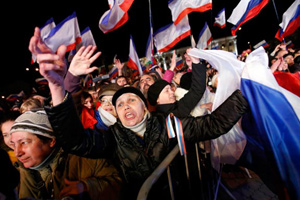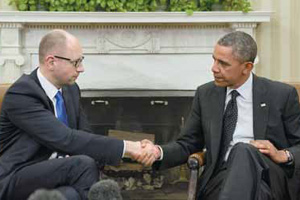WASHINGTON - US President Barack Obama on Monday slapped sanctions on two top aides to President Vladimir Putin and nine other people linked to Russia's military incursion into Crimea as tensions increased between the two countries over the Ukraine crisis.
 |
| US President Barack Obama speaks about the crisis in Ukraine from the White House in Washington March 17, 2014. [Photo/Agencies] |
Facing one of his toughest foreign policy tests yet, Obama made clear the United States was prepared to impose more sanctions if Russia formally annexed Crimea in response to a weekend referendum in the region that Washington and its allies called illegitimate.
"Going forward, we can calibrate our response based on whether Russia chooses to escalate or to de-escalate the situation," Obama said.
The sanctions were the most visible sign of US anger at Russia's attempt to absorb the Crimea region in southern Ukraine, reflecting the deepest plunge in US-Russian relations since the Cold War.
Senior administration officials told reporters the penalties were the most comprehensive sanctions applied to Russia in more than two decades.
Republican Senator John McCain, however, said Obama did not go far enough when the president cited so few individuals and no businesses.
The US sanctions came in an executive order signed by Obama a day after a Crimea referendum aimed at allowing Russia to annex the autonomous region.
"If Russia continues to interfere in Ukraine, we stand ready to impose further sanctions," Obama said.
Putin signed a decree on Monday recognizing Crimea as a sovereign state and was expected to take up the annexation issue with the Russian parliament on Tuesday.
Obama's ability to influence Putin has proved minimal. The two spoke four times over the past three weeks even as Russia moved closer to Crimea.
The belief among US officials, however, is that calibrated sanctions over time will damage the Russian economy, which has close ties to Europe, and force Moscow to rethink.
Amid fears that Russia might move into eastern Ukraine, Obama said provocations will achieve nothing except to "further isolate Russia and diminish its place in the world."
Obama's order freezes any assets in the United States and bans travel into the country of seven ranking Russian government officials and four individuals identified as Crimea-based separatist leaders. Ousted Ukrainian President Viktor Yanukovich, who fled Kiev after bloody protests against his rule, was among those sanctioned.
The United States also reached into Putin's inner circle by naming presidential aide Vladislav Surkov and adviser Sergei Glazyev.
Steven Pifer, a senior fellow at the Brookings Institution think tank and a former US ambassador to Ukraine, said Surkov was a long-time Putin assistant and that Glazyev had been the Kremlin's point person on Ukraine over the past year.
"These steps by themselves likely will not change Mr. Putin's course, but he has to take account that both US and EU officials say more sanctions are on offer, perhaps including broader financial measures against Russia," Pifer said.
Russia's deputy prime minister, Dmitri Rogozin, and two state Duma deputies, Leonid Slutsky and Yelena Mizulina also were targeted.
A senior official said Obama's order cleared the way for sanctions on people associated with the Russian weapons industry and targeted "the personal wealth of cronies" of the Russian leadership.
Putin himself was not sanctioned. A senior Obama administration official said it would have been highly unusual and extraordinary to target a head of state.
White House spokesman Jay Carney did not rule out sanctioning Putin or providing military assistance to Ukraine, but said the focus so far was on diplomacy and trying to de-escalate the situation.
Carney shrugged off a Russian TV anchor's comment that only Russia had the power to reduce the United States to radioactive dust.
"People say crazy things on TV all the time," he said.
The administration announced plans for sanctions two months ago but had not named the individuals until Monday. The European Union also imposed travel bans and asset freezes on 21 Russian and Ukrainian officials on Monday.
Obama said he would travel to Europe next week and that Vice President Joe Biden was headed on Monday to Poland and Lithuania to reassure US allies in the region.
"Our message will be clear, as NATO allies we have a solemn commitment to our collective defense and we will uphold this commitment," he said.
A senior Obama administration official said there was "concrete evidence" that some ballots in the Crimea referendum arrived in some Crimean cities pre-marked.
Officials said they did not fear retaliatory measures from Russia, saying they believed that country had more to lose politically and economically from isolation than the United States. They doubted Russia would cut off cooperation in trying to resolve disputes with Iran and Syria.
|
 |
 |